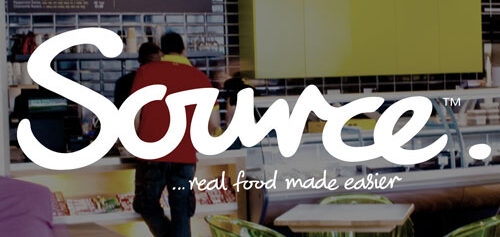In the first instalment of Stories with Founders, we sit down with Jeremy Samways of Source Food. Founded in 2003, Source Food’s objective is “to provide real, fast and healthy food at affordable prices.” During our conversation we discuss mistakes made and lessons learned during the planning phase of the business, and why the food industry is such a difficult nut to crack.
Six Day Business (6DB): With a name like Source Food we could probably guess that it’s something to do with food, but what industry would you say you’re in? Who are you competing against?
Jeremy Samways (JS): We started very much in a traditional delicatessen. I’m inspired by the New York place Dean and Deluca and places like that that we visited on trips. They seemed to have a very interesting and, from my UK point of view, unique take on how to display and sell fresh foods.
We tested the deli, we then moved into more a ‘food-for-now’ business which could compete with the likes of EAT and Pret and Wasabi.
The reason we changed direction is that making money as a deli is quite difficult, certainly in the UK, or it was when we started. Whereas the ‘food-for-now’ market is established and burgeoning, and we found a good niche there.
6DB: That’s an interesting differentiation isn’t it—opening vs. testing. What was the first step that you took to test this business?
JS: In terms of actual testing, we did a focus group when we ran a single session, that tested the ‘brand concept’ which was “real food made easier”. This was our strap line and what we wanted to base the business on.
That was the extent of the testing. We did lots of research in terms of pricing and the suppliers and how the market operates, how much people spend on deli foods. There wasn’t a lot of in-market testing.
6DB: This leads in well to the next question. What would you say to someone looking to set up a food business, and what would be a good first step?
JS: Without wishing to sound cynical, the business is very, very hard.
We were inspired by the fact that if you’ve got the operations right, you can adopt a kind of cookie cutter approach and as soon as you’ve got one store right it’s not geographically limited. You can put another store nearby, and then another one three miles away and so on.
Using this model you can quickly build up a presence as we’ve seen with the chains like EAT and Pret. But getting that right is a minefield and there are so many factors to consider.
It’s an incredibly low-margin game. You have to have everything really, really tight, and there’s a huge number of factors you need to get right.
For example, a key one for us, the most important thing in fact, was food wastage. To run a very nice deli, a really nice up-market food store means you have to have great upmarket food. In this niche a wheel of cheese can cost £180. If you only sell a quarter of that because you haven’t got the footfall then you are throwing away a huge amount of money. If that continues to happen you have a problem on your hands.
We spent a huge amount of time developing the brand and looking at who the suppliers were, but didn’t focus on footfall.
And as I’ve said before, the whole planning process was kind of done in a vacuum, which was certainly a mistake because on paper it sounds brilliant. When we asked people what they thought everyone said, ‘Yes, I would go there, that’s the kind of thing I like!’
But in reality the challenges we faced, things like wastage, problems or refrigeration, or turnover of staff or encouraging footfall… there were just lots and lots of things for a new business, a new food business, to get right.
And we had no experience in running a food business! My partner had experience in buying for Sainsburys, and I have lots of marketing experience (and to be honest those two parts of the business went very well). It was all the other things where we were making it up where the issues came along.
You didn’t ask what I’d do differently, but you know, some advice in general.
6DB: Exactly. I am seeing lots of food trucks all over the place, even outside our office on the side of the street. Is that something that you would have tried? Or is that still a kind of vacuum because you’re not in the spot you’ll eventually set up shop?
JS: Yes, absolutely. If you’ve got food product then these pop-up stores are brilliant. And I have a friend who has done exactly that with the Yorkshire Burrito (as you can imagine, it’s like a full Sunday roasts inside a Yorkshire pudding) and you can test that at a very low cost. You wouldn’t have to create a shop to sell this—the food is the experience.
Our concept, rightly or wrongly, was around the whole shopping experience and how the food is sold. That is quite different to test.
If you have the benefit of being backed by a big company, you can hire a little corner of an existing store and try it out. We, on the other hand, were first time property leasers and so you’re battling with huge chains that are willing to pay premiums for good locations. We had very thin margins and so when you’re paying this rent you need make sure it works and work on incrementally improving each part of the business.
If you get that right, then it’s a brilliant business to be in because you can replicate and you can scale up easily. We built our business around being able to replicate, but circumstances as they were, you know, we had the footfall, we had loads of people coming in, but the average spend was very low. The feedback was ‘This is a great store, just what Richmond needs and I love it,’ but they wouldn’t actually buy anything.
So it’s not only the customer saying it’s a good idea, it’s the right customer.
6DB: One last question before we go. What one piece of advice would you give someone starting out that they’re not going to read in a business book?
JS: We had a very, very solid business plan. We spent almost a year creating it and we’ve always been focused on having a plan and sticking to it. My overriding learning from that whole experience was that you need to know when it’s time for the plan to change and when to stick to it.
Doggedly following what you’ve created in a vacuum is going to end in failure for a lot of reasons. The reason the business is successful now is because we were able to move from a deli to ‘food-for-now’ concept quite quickly. It caused lots of discussions and issues in terms of making that happen because it was a long way from our initial goals, but if we hadn’t the business wouldn’t be around today.
Thank you for joining us, Jeremy.
Thank you for having me!

